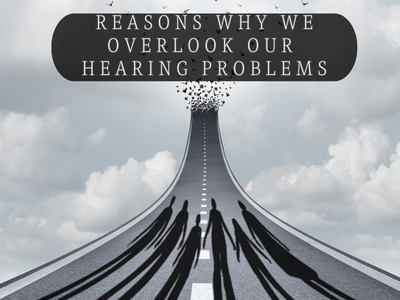Our Hearing Blog

Reasons Why We Overlook Our Hearing Problems
Hearing better is a transformative experience that positively impacts various aspects of our lives. From deepening social connections to enjoying the sounds of life and boosting cognitive abilities, the benefits of improved hearing are undeniable. By addressing hearing problems and hearing issues, seeking appropriate interventions, and utilizing advanced hearing technologies, we can unlock a world of happiness, improve mental well-being and reduce the amount of stress caused by hearing related issues.
So, why do people put off hearing loss and think it’s not a bigger problem? For most, it occurs gradually, then there is one’s ego to the typical personal denial. DID YOU KNOW...? Changes in hearing begin at the age of 20, with a significant decline in hearing ability occurring as early as 40 years of age. From the obvious to more subdued reasoning, here are some additional reasons why people might overlook their hearing problems:
1. Gradual Onset: Hearing loss often occurs gradually over time, making it difficult for individuals to notice the subtle changes. They may adapt to the decreased hearing without realizing it's becoming a problem.
2. Denial: Some people may deny or downplay their hearing difficulties, fearing that acknowledging the issue will make them appear weak or old.
3. Social Stigma: Hearing loss can be stigmatized in some cultures, leading individuals to avoid seeking help or admitting they have a problem.
4. Lack of Awareness: People might not be aware of the signs of hearing loss or may not recognize that their difficulties in communication are related to hearing problems.
5. Misattributing Symptoms: Hearing loss can be mistaken for other issues, such as memory problems or simply "not paying attention."
6. Fear of the Solution: Some individuals might be afraid of the potential need for hearing aids or other interventions, perceiving them as cumbersome or intrusive.
7. Self-Sufficiency: People often rely on visual cues and context to fill in the gaps caused by hearing loss, leading them to believe they can manage without intervention.
8. Difficulty in Self-Assessment: It's challenging to self-assess hearing abilities, and people might not realize the extent of their hearing loss until it significantly impacts their daily life.
9. Family Normalization: If hearing loss runs in the family or is prevalent among friends and relatives, individuals may see it as a normal part of aging and overlook their own hearing problems.
10. Avoiding the Doctor: Some individuals might avoid seeking medical attention due to fear, lack of insurance, or financial constraints.
11. Busy Lifestyle: People with busy schedules might prioritize other aspects of their life and delay addressing their hearing issues.
Overall, overcoming these barriers requires increasing awareness about hearing health, reducing stigma, and encouraging regular hearing check-ups to detect and address hearing problems early on. If you or someone you know suspects a hearing problem, it's essential to consult a healthcare professional or an audiologist for proper evaluation to help assist in improving your hearing situation.
It can be hard to admit to yourself and to others that your hearing isn’t as sharp as it once was. You’re worried that your loved ones might think of you as old, or that your friends will treat you differently. Wearing glasses is nothing to be ashamed about, so why are changes in hearing seen with such negative stigma that people choose to live with untreated hearing loss rather than finding a solution for their hearing needs?
In reality...Hearing loss is an invisible disability, and many people are afraid of being singled out if they talk about their hearing loss. Unlike a vision impairment, where everyone can see that you wear glasses, hearing loss doesn’t have any clear markers. We don’t realize that, just like vision problems, hearing problems can affect people of all ages, including children, teens, and adults.
The best thing you can do for your physical, mental, and hearing health is to treat your hearing loss early and shake off the social stigma of hearing loss. Educate your family and friends about hearing loss and remind them that over 48 million Americans of all ages have hearing loss.
Seriously...The benefits of treating hearing loss include strong relationships and a healthy social life. You won’t need to ask people to repeat themselves, but can easily follow conversations, even in challenging listening environments. With hearing aids you’ll be more active and feel confident in every situation. At Mid America Hearing Center, we provide real affordable options so that hearing loss won't hold you back.
We know and understand what it takes and how to help improve your hearing.
Take the first step today, by scheduling a FREE Hearing Exam and a Free Cognitive Screening.
Call to Schedule an appointment: (417) 466-7196
Blog Archive

